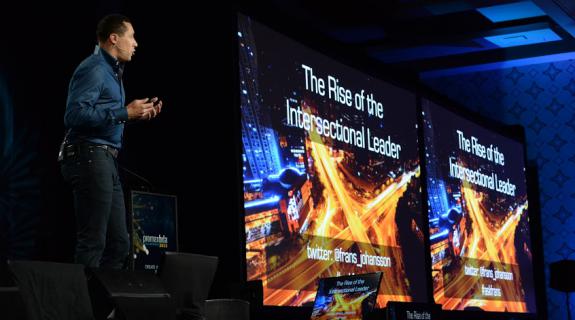Frans Johansson’s mother was African-American and Cherokee, his father Swedish. It was an important personal detail to note at the start of his PromaxBDA: The Conference 2015 session “The Click Moment” because Johansson, like innovation itself, is the product of different cultures combining.
“Whenever I was able to combine concepts from different cultures, I had a better chance to break new ground,” said the CEO of The Medici Group, whose book The Medici Effect looks at how that very notion manifests in the real world. Johansson’s second book, The Click Moment, assesses how people can step into that intersection of unrelated ideas when it occurs.
“We live in a world in which the rules are changing so quickly, we can no longer rely on logic or our own expertise to guide our decision-making,” Johansson explained. Tennis star Serena Williams is one of the greatest ever in her sport, but her “dedicated focus and practice” only works, he said, because the rules of tennis are unchanging and “she knows exactly what she has to do to be successful.”
Most of us do not have that luxury, though that didn’t stop Netflix CEO Reed Hastings or Virgin Group founder Richard Branson.
“How many hours of practice did Hastings have in video rentals?” asked Johansson. “He rented some movies, he didn’t like it, so he started Netflix. How many hours of practice did Richard Branson have in running an airline? None.”
The success of both men came not from their level of experience in their chosen industry, but from their willingness to take risks with something that wasn’t there before. “The point of strategy cannot be to find the right answer, because you’re likely to be wrong,” said Johansson. “Diversity drives innovation – of perspectives, of divisions and functions within companies, of genders, of sexual orientation… anything that gives you a different take on an opportunity or challenge.
“All new ideas,” he continued, “are combinations of existing ideas.”
To illustrate his point, Johansson cited the successful fashion trend known as the “Burkini,” a swimsuit designed for Muslim women who wish to follow the modest dress code expounded in the Koran, but still swim in public places. The idea for it emerged when Lebanese-Australian designer Aheda Zanetti realized she could combine two seemingly disparate cultures, said Johansson: “beach culture and Muslim culture.”

Individuals at every level, said Johansson, can “seek inspiration from industries or cultures other than your own.” Meanwhile, companies can “create diverse teams” and encourage them to “place many bets” rather than throwing all the hats into one giant ring. Picasso, he told the crowd, “created more than 50,000 works of art in his lifetime.” Rovio created more than 50 games before Angry Birds turned the company into a global sensation.
“If you want to innovate you have to be prepared to fail,” said Johansson. “Reward output. Punish inaction.”
The path to innovation is not a line from point A to point B, but a series of “smallest, executable steps,” he concluded.
Case in point: Sweden’s famous Icehotel, which began with a developer’s idea to simply monetize the wintry weather of his frigid small town. For small step one, he brought in some ice sculptures people could look at. The next year he created an ice gallery to house the ice sculptures. The next year, he installed ice beds so people who wanted to could sleep in the ice gallery. One step led to another and only over a period of years did Icehotel’s connective tissue begin to come into focus.
“The world is connected,” said Johansson. “I hope I’ve been able to share that with you today.”
Tags:













































__twocolumncontent.jpg)











